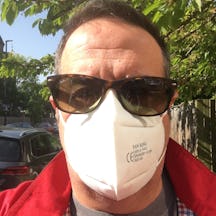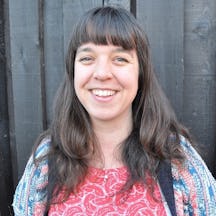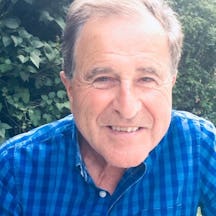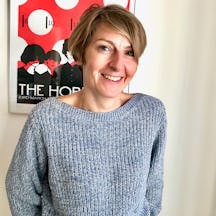Coronavirus has made conversation complicated. It also means there are lots of difficult things that need to be said. In the third episode of his lockdown podcast, Mark Thomas talks to health workers about communication. Mark’s mum, meanwhile, cheerfully contemplates her own demise.
It’s good to talk
Hosted by Mark Thomassound by Helen Atkinsonproduced by Nicolas Kentproduced by Susan McNicholasphotography by Franklyn Rodgers
- Podcast
- Serial
Listen here
Speaker 1: Hello?
Speaker 2: How have you been? You all right?
Speaker 1: Yep, no problem.
Speaker 3: Oh, hello. Oh my goodness!
Speaker 4: Yeah, of course, that's fine.
Speaker 5: No, that's fine. Hello, yes.
Mark Thomas: Hello and welcome to ‘Mark Thomas’s lockdown check-up’. I’m Mark Thomas, and this is the podcast that talks to health and care workers throughout the coronavirus about their lives and work. This is our third episode.
You join me again in the spare room of my 85-year-old mother’s flat in south London. This is a small, white-walled cube. It has all the facilities of a monk’s cell and all the charm of a panic room, but this is where the action takes place. This is where I call the health and care workers that I chat to nearly every day, and so it’s quite apt that I should record the podcast from here too.
When my mum moved into this flat, one of the first things she did was show me where her “do not resuscitate” instructions were kept. Now, bearing in mind how curmudgeonly she can be, it’s no surprise that I have not forgotten where they are.
My mum is very matter-of-fact about her departure from this world, perhaps because she was a nurse.
Mum: Now this is when I think you should have a little button to say: “Enough’s enough. Boom. Bye bye.” And Mark is horrified at that idea.
Mark Thomas: What I’m horrified at is the thought of the boom and the mess.
Mum: He doesn’t even like that I’ve got a DNR.
Mark Thomas: Genuinely, I have no problem with this. In fact, I offered to get DNR embroidered on a pillow for her. And for Christmas, I asked if she might like the words tattooed on her knuckles. My mum recently went to her GP and had a discussion about what she wanted to do if she contracted COVID-19.
Mum: But my GP knows this, because when she asked me had I thought what I’ll do if I’ve got this, and I went, “Nothing.” She said, “You don’t want ventilation?” I went, “No, I don’t want hospital.” Mark says, “Oh, you could go to hospital and you could get the drugs you need.” No, what would they give me, Mark? Use your brain.
Mark Thomas: My mum’s memory of the conversation is slightly at variance with my recollection. I had said that if she contracted COVID-19 she could go to hospital to get the drugs that she would need to make her dying at home easier. She had then said what she always says in these circumstances...
Mum: I am allergic to opiates.
Mark Thomas: As if she expects me to see her in a state near death. And I will rush around south London trying to find gluten-free heroin.
Mum: I’m 85. Why would they waste a ventilator on me when there’s younger people needing help? I bail out graciously.
Mark Thomas: Well, there’s a first for everything.
Mum: Or perhaps not quite so.
Mark Thomas: That’s more like it. Neither of us have a problem communicating. Not with each other, anyway. What we do both do is we alter our memories to suit the impressions that we have of one another. I am flighty and not connected to this earth. She is grumpy and prone to invention.
But no matter what we think of each other, both of us are very clear about her intentions on the matter of her DNR. And this is what this episode is about. Not the DNR, the communication.
For the network of health and care professionals that I talked to, the changing circumstances of communication has been an issue. And some of them have grappled with it, and sometimes in unexpected ways. This is George, who is a geriatric consultant talking about communicating from behind his PPE.
George: Patients can’t see your emotion or see your mouth and expressions, so communication is somewhat stunted. It makes you realise how much we rely upon facial expression to get the sentiments across. If you’re trying to be empathic, it’s very difficult when they can only see the white of your eyes.
Mark Thomas: I recently made my mum cauliflower cheese, not a hard task, but it was done from scratch and with no mean degree of precision. “I’m enjoying this,” I had said. My mum replied, “You wouldn’t want it every night.” This shocked me, because normally if I say something like, “I’m enjoying this,” or, “I’m happy,” her normal rejoinder is, “Well, you should tell your face.”
This is Anna, who works as a nurse in a hospice where family and friends are allowed to visit if they are wearing PPE.
Anna: And sometimes people come on the ward and we don’t recognise them until they’ve actually put a mask on, because we’re only used to seeing their eyes. I think your brain goes, “Oh, what’s all this stuff down here?” When normally you’re only looking at this bit.
Mark Thomas: This idea of communicating with faces is something that Anna and I spoke about a few times. Here she is on another conversation, returning to that topic of faces and communication.
Anna: Another thing with PPE, of course, is faces. You can’t see people’s faces. All you can see is eyes. If you’re hard of hearing then you depend an awful lot on lip-reading, which you can’t do with a mask.
Mark Thomas: Throughout the pandemic, communicating with people with dementia has been problematic. They are often the most likely to need shielding and the least likely to be able to retain the information required to do that.
My dad had a form of dementia and sometimes he would just disappear inside himself. Once we were taking him to a shopping centre in Bournemouth. My mum drove the car round and round the car park, looking for a space, but being Bournemouth, all the disabled parking spaces had been taken. In frustration, my mum shouted, “It’s like a bloody car park.” I said, “It is a car park.” And just in front of me, I saw my dad’s shoulders in the front seat shaking up and down as he laughed.
This is Jules, who is a dementia nurse, talking about staffing the helplines.
Jules: Another lady I spoke to, she was worried about her mum going outside. And she didn’t know how to talk to mum about COVID-19 without causing her fear. And she was going to put a notice on her mum’s door to say, “Don’t go outside because there’s a plague at the moment.”
Mark Thomas: Which would alarm anyone, let alone someone who thinks they’re finding out about plague for the first time every time they see it.
Jules: So, I just said to her, “Well, why don’t you just put a note on the door saying that the local shop is closed for refurbishment, and that may stop her from going to the local shop.” And I said, “The other thing is, is maybe give the local shop a ring, because they’ll know her really well. Or you might just want to let them know that she’ll struggle with social distancing, because she doesn’t understand.” And I said, “They can then social distance from her. And that will keep her safe.”
Mark Thomas: Communication is not just, I say something and somebody hears something, but it’s being able to say what you need to say safely to someone who is willing to listen.
Sharon is a Black health worker who did not find this to be the case in her place of work.
Sharon: It was obvious early on that we were more at risk, because the first staff, the first ten doctors that died from COVID, were all from Black and minority backgrounds. Because this was early on it was about PPE, and they were saying that we’re worried about it but couldn’t raise it because they’re less likely to raise concerns because of fear of being reprimanded.
Mark Thomas: Why would you be reprimanded?
Sharon: They’re more likely to be disciplined, ethnic minority staff, even doctors.
Mark Thomas: Effective communication needs to occur in an absence of fear. As we move to contain the virus and prevent its spread, as pubs shut and supermarkets socially distance, the normal business of diagnosing and treating the ill changed too.
Jackie is a GP in east London.
Jackie: I find myself liking it less and less and less, this telephone business, because I find myself getting into a groove now where I’m really trying to stop people coming in.
Mark Thomas: The urge to have sight of patients was tremendously common with the network of health professionals I was talking to. Literally every single one of them. It was if the doctors and consultants and nurses were actually missing their patients.
This is Max, a consultant, on why he wants a patient in front of him.
Max: So, when we’re starting cancer treatment, you’d often have to make an assessment as to how the patient is. And some of those things are quite objective. You can measure their age, for example, how far they can walk, what other medical conditions they’ve got. But you also get a sense from seeing someone in the flesh, how they walk from their seat to the clinic room, who’s with them, how they interact, as a sense as to how much they can tolerate. And over the telephone, you just can’t do that.
Mark Thomas: If you listen to the last episode, you might remember Sylv, my mum’s friend who washed her newspaper down in June to stop COVID-19 getting into the house. When Sylv finally did come round to visit my mum, the sense of relief from the pair of them, of physically being in each other’s company, was palpable. And I think the absence of actually physically meeting people in the flesh was something, well, is actually too much for doctors who worried about not finding out the truth, of not probing enough, or not spotting something.
This is Jackie the GP again.
Jackie: We are going to have to start seeing people face to face again, which to be honest I want to do, because I’m quite a sociable being. And I think also general practice, it thrives on personal relationships, which you don’t get in the same way over the internet or over the phone. And I think we’re holding too much risk now, because we’re not seeing patients face to face.
Mark Thomas: There were those for whom the arrival of Zoom and Skype and all the other platforms actually might be a way forward.
This is Sarah, who is a GP, and she talks about patients coming to see her in masks.
Sarah: And I have to say, a few of my patients, who I know have got mental health issues, Asperger’s, ADHD, who really do struggle with it. And with those patients, I’ll say, look, when they get into my room I’ll say, “You can take the mask off.” I still have mine on and we can have a consultation.
In fact, a lot of these patients as well, we can try and negotiate them doing them over the Zoom, actually. And you explain to them then they don’t have to put their stuff on, and that can be quite beneficial.
So, it’s all about building trust. Because these patients are really struggling. I think the impact on mental health, I think, is just... We just can’t underestimate it.
Yeah. And it means they don’t have to come to the surgery, because that can be quite anxiety-provoking for a lot of the patients. A lot of the patients have young children. There is a lot of positives with it.
Mark Thomas: My mum attends a Zoom church service every Sunday and I play roadie to the event. She sits in the chair. I tug my jeans down to a barely acceptable level, crouch and randomly run around the living room moving cables. I then locate her tablet, connect her to the rest of the congregation and say, “One, two. One, two. One, two.”
My mum always goes, “I don’t want to appear too early. Don’t put my picture up. I don’t like people looking at me.”
This is my mum talking about her attitude to technology.
Mum: I’ve spoken over the phone to them and that was okay. What would be the point of giving me a video consultation with them? I’m a dinosaur. I can fiddle with computers, but I can make them go wrong frequently. Mark!
Mark Thomas: This is Jackie, again, on the technological generational divide and what it might mean for health services.
Jackie: So, you’re prioritising access for those who need us least at the expense of those who need us most. The young and savvy love it. They love being able to get in touch with their doctor or their nurse, or whenever it’s convenient for them, and not having to come up and do it all online.
Mark Thomas: Jackie was worried that this remote way of seeing patients might become the norm after coronavirus, and she may be right. Eimear is lead in infection control in a London hospital, and this is what she says.
Eimear: And now, as people get back to delivering clinics again, they’re asked to really reduce the number of interactions that are face to face. So they’re being asked to think about their service as having only 25 to 30 per cent of their interactions face to face with patients. That’s a huge change.
Mark Thomas: Away from the tablets and Zooms, most people communicated in a more pedestrian fashion. One of my neighbours rings the bell, backs away and waits for me to open the door to find the curry on the doorstep. We exchange a few words, she leaves, and I express my profound gratitude in a text an hour later.
My daughter shouts over the garden gate – that’s her preferred method of communication. Another neighbour shouts through the letterbox, which I then have to wipe down.
In the care homes the business of visiting has been radically changed. This is Mike, who works in a care home for people with dementia.
Mike: And we’ve got a little balcony that sticks out in the car park. So we have what we call “car-park visits”. So, families will come into the car park and shout up to the balcony, and people can see each other and talk.
So we’re still trying to keep some contact. I know a couple of residents, a couple of patients do get something from the video calls, but not all of them do. But for the families, it’s very important to them that they’re still seeing them, they’ve still got the contact.
Mark Thomas: I just love this idea of families shouting from a car park. Loved ones standing on a balcony. And I love it on so many levels. I love the joy of it, I love the shouting, I love the proximity, I love the appearance of the balcony. And I said to Mike, “I want to know if any families have turned up with a loudhailer?”
Mike: They don’t need to. Oh dear.
Mark Thomas: Hello Mum!
Mike: I think sometimes it would be great for Skype; the sound quality’s awful. Yeah. We can get quite close because the balcony does come out over the car park, so they can see them. So that’s good.
Mark Thomas: Right.
Mike: It doesn’t always go well, but you know. Obviously, working with people with dementia, sometimes they have mixed feelings about what we’re doing. We had a visit the other day and the gentleman who we had out was trying to punch us as he’s seen his wife. And he’s going, “Can you get these bastards off me? They won’t leave me alone.”
And his wife shouting up and going, “You behave yourself, you! Stop being naughty!”
Mark Thomas: Like Mike, Naomi works in a care home. And some of the most difficult communication she had to deal with was at the height of the pandemic, as COVID-19 moved through the home with deadly consequence.
Naomi: And this was another really hard thing was, how do you tell the other residents how, when to tell the other residents that residents were dying? And that was quite difficult, because there came a point and people would be asking, “Oh, how is Mr So and so?” Yeah, that was very hard.
Eventually, a sort of newsletter went out to the residents to say that several people have died; they weren’t named. And then it was just word of mouth. If they asked... I guess, you give people that option, otherwise you might be traumatising if you did a death toll role. That might be really too much for some people, if some people wouldn’t want to know. So, yeah. Then it was just if people asked.
Mark Thomas: Throughout the pandemic, there’s been lots of stories about people communicating with tablets and phones, and people being there with their loved ones via the internet.
This is George, the consultant who you heard at the start of this episode.
George: She was dying from COVID pneumonia, and both her son and her father couldn’t come to see her because they were at risk themselves. And so I basically video-called them with my phone and allowed them to see her in the last few hours of her life. And I don’t think they were truly aware of how sick their relative was.
If they had been in hospital with her in the previous couple of days, they would have understood. They were shocked when they saw her, and were crying on the phone, and obviously very upset. But they were grateful. And they said that they were really grateful that we’d been able to offer them that opportunity to see their mum and wife before she died, and to know that she was comfortable because we’d been treating her with end-of-life medications.
Mark Thomas: I’ve wondered what it would be like to bear witness to those calls, to hold the phone, to hold the tablet? And I wondered if it might be a burden? I wonder if it might be a privilege? I suspect it could be either. It might even be both.
Certainly Sophie, a nurse from Liverpool, found the task of just holding the device and being part of someone’s farewell very difficult.
Sophie: It’s awful because in the normal world, they were saying stuff that I shouldn’t hear. They were saying their last goodbyes to their dad. Now, I shouldn’t be privy to that conversation. Normally you would withdraw. You draw the curtains, make them a cup of tea. We’d just be outside, and that time would be private between them and their relative. And you’re being a window to that. And that, I think, is perhaps... I don’t know. A lot of the IT nurses, ICU nurses might feel the same. You’re privy to their last words to their dad. That’s terrible.
Mark Thomas: Witnessing someone’s passing, and the last words exchanged between loved ones, might feel an intrusion for some. But I like to think that every nurse and doctor who did that, who held those tablets and held those FaceTimes, I like to think that they regarded that task as a special task, possibly even a sacred one.
This is Siobhan, head of nursing in a London hospital.
Siobhan: I saw a lovely tweet. Someone went to pick up their husband’s belongings from the hospital, and there was a note; it made me cry. There was a note from the nurses saying, “We sat with your husband.” It’s very touching. I don’t get all emotional.
But they put a note in with his, so she knew that they were the people that held his hand when he died. Well, that’s a big... They’ll carry that for always, those nurses. And that woman will know that her husband was okay when he died. And I think that’s a great thing about nursing, isn’t it? Oh, I don’t know why I’m getting so emotional.
Mark Thomas: If Marshall McLuhan is right and the medium is the message, then as the medium is Boris Johnson, the message is incoherent, blustering and largely improvised.
Max, who you heard earlier, is less than impressed with government communication.
Max: It’s a common call I have with individuals, patients, when they say to me, “I don’t know what the advice is. I don’t know what to do. Does this apply to me?” And equally I have to say, “Well, I’m not sure either, because it’s not clear and it’s been changing.” It’s less than ideal, let’s say.
Mark Thomas: Naomi, you remember, worked in a care home. The guidance she received veered from non-existent to contradictory.
Naomi: It changed. It changed a lot. And I know that there’s been reports of this. The amount of guidance, streams of information. So, the mainstreams were Public Health England, NHS, and then the government’s local authority. And different places were giving slightly different information. And that’s where conflicts started. So some members of staff were going by one set of rules.
Mark Thomas: I asked Naomi what guidance and preparation the care-home staff were given when coronavirus appeared on the horizon.
Naomi: We had one meeting in a corridor when we were all told about washing your hands and wearing PPE. But apart from that, it was like...
Mark Thomas: In a corridor?
Naomi: Yeah.
Mark Thomas: So it was really urgent.
Naomi: Yeah.
Mark Thomas: For me, Naomi’s analysis of what happened is summed up in one sentence.
Naomi: In a war, you need a bloody good general, and we didn’t have one.
Mark Thomas: Barbara is a consultant in a major trauma unit in a London hospital. And I spoke to her in the week of the Barnard Castle debacle.
Barbara: Testing’s over, isn’t it? Dominic Cummings has put paid that. Who on earth is going to stay indoors now?
Mark Thomas: So, lockdown is gone.
Barbara: Yeah. I think so, don’t you? What a message is that? It’s basically like, do whatever the bloody hell you want to do. So, if we got a second surge and they said, “Right, everyone, we have to lock down again,” who’s going to do that any more?
Mark Thomas: The week of the Cummings press conference felt angry and incredulous. And it was reflected in the conversations I was having.
This is Siobhan, a head of nursing at a London hospital.
Siobhan: It seems like, thanks to Dominic Cummings, we all think this is all over and done with a little bit now. I feel that the public mood has moved into sunshine, beaching and walking in the park.
Mark Thomas: What’s your mood?
Siobhan: My mood is, I know it’s still out there. Although I see we have less than 20 patients in our intensive care, one could say we still have nearly 20 patients in our ICU that are COVID patients, that are still in a life-critical situation.
But the feeling is that the mood has changed. And I have to say, the whole Cummings thing, it’s disingenuous, the whole thing. And it’s really upset me because I haven’t really been a Boris fan. It’s a bit like Trump. I thought it was amusing and funny that someone like Trump could become president. I thought that Boris, on his journey that he got to prime minister, and now I think he is a clown, really. I thought he was quite an intelligent, educated guy, which he quite clearly is, but now I feel that we’re in danger of this really having panned out much, much worse than it might have, had we made some different decisions at different times.
Mark Thomas: So, while my mum and I debate her end of life, and traverse the emotional landscape of her wishes and her death. And I think that this is the type of conversations that people are having up and down the country about what we value, about what we want, about how we care for each other. The one thing that should have had a “do not resuscitate” letter was a political aide’s career. That awkward conversation between Number 10 and its adviser did not take place, and I think we have all paid the price.
As always, thank you for listening. Thanks to the health and care workers who gave up their time to speak to me. Thanks to the Imperial Group of NHS hospitals. And thank you especially to my mum.
I hope you’ll join us for the next episode, which is on isolation.
‘Mark Thomas’s lockdown check-up’ was recorded, written and presented by Mark Thomas. The sound editor was Helen Atkinson. The producers were Nicolas Kent and Susan McNicholas. And the podcast was commissioned by Wellcome Collection.
Speaker 1: All the best Mark, take care.
Speaker 2: Thanks for the free therapy.
Speaker 4: Give your mum a hug from me as well.
Speaker 3: Okey doke, take care, bye.
Speaker 5: And you mate, see you soon.
Speaker 6: Really nice to talk to you, and look after your mum.
About the contributors

Mark Thomas
Mark Thomas has been a writer and performer for 35 years.

Helen Atkinson
Helen Atkinson is a sound designer working in theatre and live events. Helen has collaborated with Mark Thomas on a number of live shows including ‘Bravo Figaro!’, ‘Cuckooed’ and ‘Mark Thomas’ Check-Up – Our NHS@70’.

Nicolas Kent
Nicolas Kent was the Director of the Tricycle Theatre in London for 28 years. His political pieces there included: ‘Half the Picture’, ‘The Colour of Justice (The Stephen Lawrence Inquiry)’, ’Nuremberg’, ‘Srebrenica’, ‘Guantanamo’ (nominated for an Olivier award) ‘The Riots’ (2012) and ‘Bloody Sunday’ (Olivier Award for Special Achievement). In 2009, he directed the nine-hour trilogy ‘The Great Game – Afghanistan’ in London, New York and Washington. In 2016 he directed ‘Another World’ at the National Theatre and in 2017 ‘Mark Thomas’ Check-Up – Our NHS@70’. He has also directed productions in the West End, at the RSC, the Royal Court, and on and off-Broadway.

Susan McNicholas
Susan has worked with Mark Thomas for nearly 20 years. She is currently unemployable.

Franklyn Rodgers
Franklyn Rodgers is an artist and creative director whose work explores innovative approaches to re-examining the portrait in contemporary visual culture. His work not only investigates portraiture through narrative, content and context, but also how their placement can open new dialogues in challenging the idea of representation within the language of photography. He has exhibited internationally and his work is held in the permanent collections of the National Portrait Gallery, Tate Britain, Lloyds of London, Welcome Collection, Autograph, Queen Mary University of London and Arts Council England.